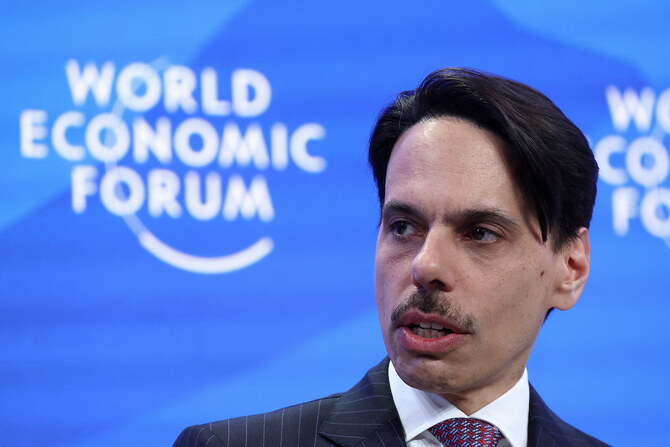DAVOS: Prince Faisal bin Farhan said on Tuesday in Davos he would visit Lebanon later this week, the first such trip by a Saudi foreign minister in more than a decade.
He made the announcement during a panel on diplomacy at the World Economic Forum’s annual meeting in the Swiss resort town.
The one-day trip on Thursday will mark the first visit by a high-ranking Saudi official to Lebanon since 2015, after years of strained relations due to Lebanon’s perceived alignment with Iran, its role in drug smuggling to Gulf countries, and ongoing instability.
Prince Faisal described the recent election of a president in Lebanon, following a prolonged political vacuum, as a highly positive development.
He said the Kingdom welcomed the potential formation of a government but emphasized the need for real reforms and a forward-looking approach to ensure sustainable progress.
He reiterated that the future of Lebanon rested in the hands of its people, urging them to make decisions that steer the country in a new direction.

A UN peacekeeper’s (UNIFIL) vehicle rides along a street in Marjaayoun, Southern Lebanon January 20, 2025. (AFP)
“We will need to see real action, real reform and we will need to see a commitment to a Lebanon that is looking to the future, not to the past,” said Prince Faisal.
“And based on what I hear there and what we see, I think that will inform the Kingdom’s approach, but I have to say what I’ve seen so far and the conversations that we’ve been hearing in Lebanon, all allow me to be very much optimistic.
“We’ve always said, it’s really up to the Lebanese to decide and to make the choices to take Lebanon in a different direction.”
Prince Faisal also said he is “cautiously optimistic” about Syria’s future, citing encouraging signs from the new administration in Damascus and the resilience of the Syrian people.
He emphasized the need for patience and engagement from both the regional and international communities to help rebuild the country’s broken institutions and create a better future for Syrians.
“I would certainly say I’m cautiously optimistic. I may even lean further because you have, first of all, an administration that is saying the right things in private and in public, doing a lot of the right things, but also you have a Syrian people that are incredibly capable and incredibly resourceful,” he said.
He urged collaboration to build on recent positive developments, underlining the collective responsibility to aid Syria’s recovery, especially considering the willingness of the new administration in Damascus to engage constructively with regional and global partners.
“The reality is that they have inherited a broken country with no real institutions and they are having to build all of that from scratch, and that’s not an easy thing,” he said.
“So it’s up to us, I feel in the region first but certainly the international community, to engage, to come and build on this positive development and help Syria and the Syrian people see a much better future.”
Prince Faisal highlighted the importance of lifting the heavy burden of sanctions imposed due to actions of the previous regime, noting some progress with waivers from the US and Europe.

A boy carrying stacks of bread on his head walks past a damaged school in Aleppo, Syria January 21, 2025. (Reuters)
Prince Faisal was also positive about the region as a whole, including the Kingdom.
“We are certainly in a region that is abundant with risk factors, but we are also in a region that has huge potential,” he told the panel.
“I would say that even with the very difficult year behind us, we have shown that we can be resilient as a region and we can actually look to the future, whether it’s the Kingdom, or the GCC countries, and their ability to stay on track with their economic agendas,” he added.
He stressed the importance of avoiding conflict, particularly in light of tensions between Iran and Israel, and expressed optimism regarding the new US administration under President Donald Trump.
“I don’t see the incoming US administration as contributory to the risk of war. On the contrary, I think President Trump has been quite clear that he does not favor conflict,” he said.
“I hope that the approach will also be met on the Iranian side by the addressing of the nuclear program, by being willing to engage with the incoming administration in a way that can help us stay on track with this positive momentum.”
Also on the panel was Mohammed bin Abdulrahman bin Jassim Al-Thani, prime minister and foreign minister of Qatar, who expressed hope that the ceasefire in Gaza between Israel and Hamas would bring much needed relief to the Palestinian people.

Qatar’s PM Sheikh Mohammed bin Abdulrahman bin Jassim Al-Thani speaks with WEF President and CEO Borge Brende during the annual meeting in Davos on January 21, 2025. (AFP)
“Let’s be hopeful (about the ceasefire). It’s still a long way to go with what happened throughout the last 15 months negotiating this very difficult conflict,” he said.
“It showed us that everything can be resolved through talks and through engagement, through negotiations, and we started this week with good news.
“We have seen the humanitarian aid coming in, we have seen hostages going back and we hope that this will be a fair system toward stability now.”





































